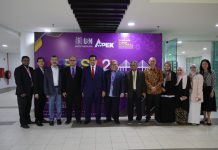THE “Third World War” is here in the form of a “Cold War” or “Technology War”. But most call it a “Trade War”.
The war between Huawei, Amazon and Google on who has the greatest capability and capacity to collect, process and analyse data has transformed into a geopolitical war between mega economies.
The world is becoming “illiterate” once again and the ones who are creating new languages are those with computational power. Everyone else is looking like illiterates. Welcome to the new world of digitalization!
How do countries fare in weathering this geopolitical storm where technology is the new “oil and gas”? And where is Malaysia in this new narrative?
These were some of the high points discussed at the forum: “Weathering the geopolitical storm: Malaysia’s new economic narratives” recently organised by Education Malaysia Global Services, Asia-Europe Institute University of Malaya and Akademi Harimau Asia.
Dr Pippa Malgrem the forum’s keynote speaker and former economic adviser to President George W Bush as well as an advisor to the UK on Brexit started her talk with a question: “Is trade really being diminished or is it simply working in a different way than it has been occurring before?”
The policy advisor said, instead of producing materials and physically packing and shipping it, today companies are just sending computer-aided design and software through email for their customers to print the material using 3D printers. “This is the dynamics of new economy. Trade still takes place but in the different form”, says Malgrem.
Malgrem said it is very crucial to understand what is happening with technology right now. It is impossible to understand the trade dispute between China and the US if we do not understand the technology part of what is occurring. Digitalisation has greater clarity now than ever.
Summit, a supercomputer developed by IBM is processing data in one second what human will take 3.6 billion years to process. Handling quadrillion datapoints has become a norm. The race in this space is creating the geopolitical war and storm. This huge technological wave is all about a race where who possess the most advanced computational power, strongest algorithms and the greatest capacity in artificial intelligence matters the most.
The biggest rivals are the US and China and the trade war between these two mega economies has created a spillover effect all around the globe and Malaysia is not immune to this.
“China is no longer the cheapest country for manufacturing. Mexico is the cheapest producers and is the most competitive in the world right now and markets are responding to this changing dynamic by “relocalising” production. Has Malaysia started looking at investing in Mexico?” Malgrem pointed out.
She also emphasised that Malaysia can certainly strengthen its economy in a number of priority areas and one such area as medical tourism with its incredible human talent in the country. Malaysian economy is much better than it has been in the past decades and the question is how the country can leverage on this?
The forum then continued with a round of intriguing discussions moderated by Wan Ahmad Fayshal from Akademi Harimau Asia and two other discussants – Dr Shankaran Nambiar of Economic Research and Tan Sri Abdul Ghani, the chairman of Sime Darby Plantation together with Malgrem.
Quoting William Gibson, a fiction writer, Malgrem said – The future arrives at different speeds for different people. I think partly it is because people are frightened by the speed of change and the speed of change itself has genuinely changed. We cannot reverse technology but we can change people’s belief.
In a reply to Abdul Ghani during the panel discussion, Malgrem said the country has been emphasising on industry revolution and I4.0 but there is merely any indication of I4.0 moving in Malaysia. The question is, how open is Malaysia towards investments from and in all over the world?
She also shed some light on future jobs. “Many of us think robotics and automation will take away our jobs. The truth is automated systems will not increase unemployment but changes the type of jobs,” she concluded.
Speaking from the perspective of a Malaysian who observes the tension and contradictions happening on a daily basis, Shankaran pointed out that Malaysia is being insulated by its own domestic problems and not so much of what is happening globally.
“We have to dismantle and restructure the way we think and the way we look at things. The whole approach to economy is different. We need to change the skill sets of graduates. Students need to be proactive and propose what they want to be taught instead of waiting for changes to take place, Shankaran added.

















